Friday Prayers Leaders Back Iran’s Removal Of IAEA Cameras

Friday Prayer leaders in Iran have backed the government’s decision to reduce access to the UN nuclear watchdog, IAEA, in the wake of a critical resolution adopted against Tehran.

Friday Prayer leaders in Iran have backed the government’s decision to reduce access to the UN nuclear watchdog, IAEA, in the wake of a critical resolution adopted against Tehran.
The Friday Imams described removing the monitoring equipment installed by the International Atomic Energy Agency as the first step in reducing relations with the agency, with Tehran's Friday prayer Imam Ahmad Khatami condemning the IAEA resolution against Iran and saying that “the revolutionaries hit the bully in the mouth."
Referring to the IAEA director general Rafael Mariano Grossi's visit to Israel, the hardliner cleric called on the authorities "not to provide complete information to the IAEA."
Similar remarks against the resolution and IAEA’s monitoring of Iranian facilities were made during the Friday prayer sermons in several other cities, including Esfahan, Arak, Bushehr, Ilam, and Ahvaz.
Iran told the IAEA it plans to remove more monitoring equipment after the 35-member IAEA board Wednesday passed the resolution. Tehran says it intends to maintain a basic level of monitoring and inspectors’ access as required under the Nuclear Non-Proliferation Treaty (NPT).
The contents of Friday Prayer sermons delivered by Khamenei's local representatives in various cities are dictated by two state bodies close to Khamenei's office, officially known as "The Policy-making Council for Friday Prayer Imams" and the "Friday Prayer Headquarters," both dominated by hardliner clerics.
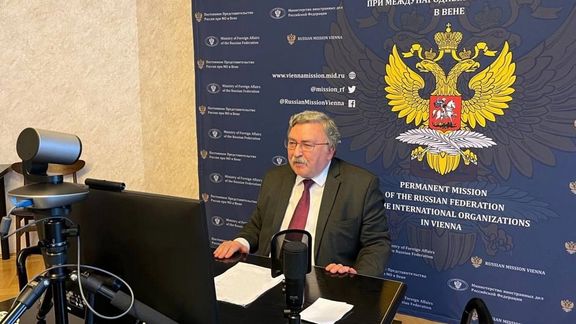
Russia’s envoy to the International Atomic Energy Agency (IAEA) told Iran International Friday there was “still time” to save the 2015 Iran nuclear deal.
“It’s feasible, it’s doable,” Mikhail Ulyanov said. The ambassador claimed agreement between Iran and world powers was “99.9 percent” achieved when talks broke off March 10.
"We were five minutes from the finishing line,” he told Iran International Fardad Farahzad in a video interview.
After year-long negotiations to revive the 2015 deal, known as JCPOA, stopped in Vienna, it became clear that Iran and the United States had significant differences over what sanctions would be removed once an agreement was inked. Iran insisted that its Revolutionary Guard should be removed from the US list of terrorist organizations, a demand Washington has refused.
Ulyanov condemned the resolution passed Wednesday by the IAEA board criticizing Iran, which he said was "counterproductive" and "illogical at a very delicate moment in the Vienna talks when the final outcome is in question.” On Thursday, Ulyanov had called the Western move “stupid”, but in the he told Iran International that he should not have deviated from diplomatic language.
The resolution tabled by the United States, United Kingdom, France and Germany passed overwhelmingly, leaving only China and Russia as countries voting against.
Resolutions were passed by the 35-member board, Ulyanov argued only “on rare occasions and is perceived as something extraordinary as a rule.”
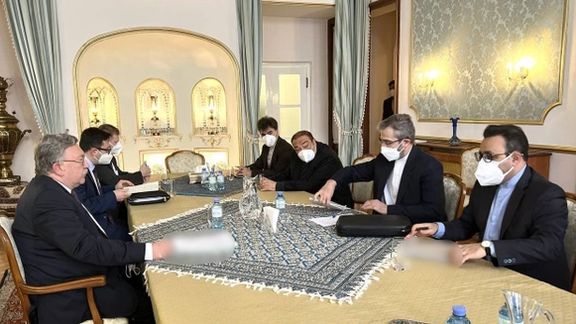
The ambassador denied the situation with Iran – including its growing stockpile of uranium enriched to 60 percent and its continuing restrictions of IAEA monitoring - was extraordinary.
“It’s not urgent,” he said. “We are talking about uranium particles which belong to the beginning of this millennium [work carried out by Iran before 2003]…nobody can insist that these particles represent any proliferation risk.” Tehran had provided some information to the IAEA, he added, including over uranium metal, so that “progress is there.”
But the IAEA thought otherwise when on June 6 its director Rafael Grossi submitted his report to the Board of Directors saying, “Iran has not provided explanations that are technically credible in relation to the Agency’s findings at three undeclared locations in Iran.”
Iran and the IAEA had agreed in March that Tehran would fully answer questions about its past nuclear work by mid-June, and the UN nuclear watchdog concluded that there was little progress in that respect.
Ulyanov insisted that the passage of the resolution had led to Iran’s “retaliatory measures” in informing the IAEA it would remove further monitoring equipment. This, he said, had confirmed his assessment expressed before the resolution was raised.
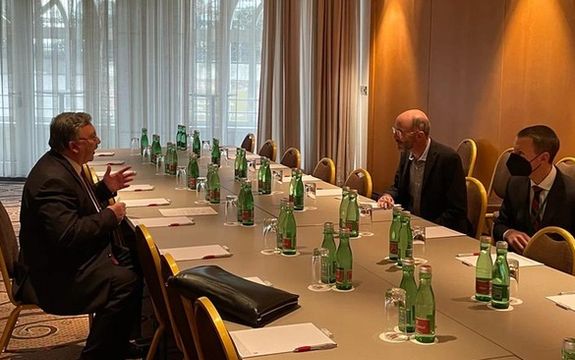
“I could not understand the logic behind this initiative of my western counterparts. I must tell you that last year they tried to do something like those three times – in which case the Russian Federation managed to convince them not to take this step.”
Such persuasion was more difficult in the current climate, Ulyanov conceded, obliquely referring to tensions over Ukraine.
Moscow remained committed, he insisted, to the 2015 nuclear deal (the JCPOA, Joint Comprehensive Plan of Action) as a “great achievement in the field of” non-proliferation.” He said that the current state of Iran’s nuclear program did not bring Tehran as near to nuclear weapons as some suggested.
“Russia is the strongest supporter of the nuclear non-proliferation regime…we don’t want the so-called ‘nuclear club’ [those states possessing nuclear weapons] to be extended… Speculations about so-called ‘break out time’ [the time it would take Iran to develop a bomb]…are not helpful…If Tehran obtains a sufficient amount of nuclear material – if they don’t have it at this stage – then they will [still] need to produce a nuclear warhead, which will take a lot of time, even if a political decision is taken in this regard.”
However, not all Iranian research and military sites are under international monitoring, and no one can be sure how quickly it can assemble a weapon once it has sufficient fissile material. By most accounts, Iran either already has or will soon amass enough enriched uranium for one or maybe two bombs.
The ambassador noted that while aspects of the Iranian nuclear program were “rather sensitive” that “at this stage we have no reason to believe Iran is looking for nuclear weapons…at least nobody has proved such an allegation.”
Ulyanov argued that Iran, while enriching uranium to 60 percent was not enriching to ‘weapons grade” [90 percent]: “To the best of my knowledge, at this stage they are not going to do that, unless somebody from outside provokes them to take some risky steps.”
But critics of the talks say that as Iran has dragged out the talks it has engaged in nuclear brinksmanship, advancing its program, while claiming it is not after weapons.
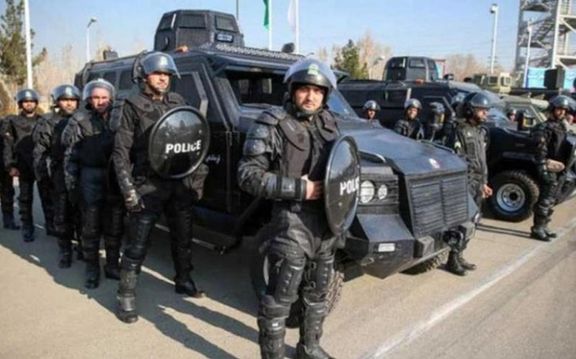
Amid a growing wave of protests across Iran, the country’s police have added about $10 million worth of anti-riot equipment to law enforcement forces, including special armored vehicles.
The deputy commander of the Iranian police, Brigadier-General Ghasem Rezaei, made the announcement during a ceremony where some of the equipment was handed over to special units, including 527 vehicles and motorcycles.
Rezaei said that the new equipment and vehicles will help the operational units better execute their missions and is aimed at "strengthening the security of the country."
In addition to enhancing operational mobility, some of the new equipment provides police forces with “self-protection” during missions, he added.
Iran has tens of thousands of special police and security units that are often deployed to break up antigovernmental protests that have become more frequent since 2017.
In November 2019, when a sudden government price increase for fuel was announced and nationwide demonstrations began, these security forces were ordered to shoot unarmed protesters, killing at least 1,500 people in a matter of a few days.
Last year, special forces were used in two provinces to quell protests during which more than ten people were killed and hundreds wounded.
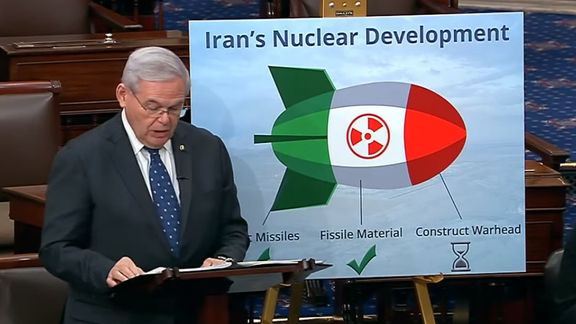
The US Senate Foreign Relations Committee has approved the Stop Iranian Drones Act (SIDA), which seeks to prevent Iran and Iran-backed militia groups from acquiring lethal drones.
In line with efforts to stop Tehran’s flourishing drone program, “the bipartisan legislation would amend the Countering America’s Adversaries Through Sanctions Act (CAATSA) to make clear that supporting the supply, sale or transfer to or from Iran of UAVs, or providing other assistance related to UAVs, is sanctionable under US law,” the committee Chairman Senator Bob Menendez (D-N.J.) and Ranking Member Jim Risch (R-Idaho) said in a statement on Thursday.
“As evinced by Iran’s drone attacks on Israeli shipping, Houthi attacks on Saudi Arabia and the UAE, and Iran-backed militia attacks on US facilities across Iraq... Iran’s reckless use and export of lethal drones to proxies and terrorist actors across the Middle East represents a significant threat to US national security and that of our allies and partners,” Menendez said, adding that “I look forward to working with my colleagues to ensure swift passage on the Senate floor and ultimate enactment of this bipartisan legislation into law.”
The House of Representatives passed the legislation late in April but it requires approval from the Senate and a presidential signature to become law.
“Iran’s regional terrorism continues to threaten not only the safety and security of our partners in the Middle East, but also American national security interests. Drones have rapidly become Iran’s weapon of choice,” Risch noted.

The Eurpean E3 condemned Iran’s action to reduce monitoring by the UN nuclear watchdog, while Washington said it would not necessarily hamper the Vienna talks.
France, Britain and Germany condemned on Thursday steps taken by Iran to essentially remove all the monitoring equipment installed by the International Atomic Energy Agency (IAEA) under the 2015 nuclear deal, saying the move cast a doubt on Tehran's will to revive the accord.
"These actions only aggravate the situation and complicate our efforts to restore full implementation of the JCPoA (nuclear deal)," the three countries said in a statement. "They also cast further doubt on Iran’s commitment to a successful outcome."
Unlike a joint statement made with the United States on Wednesday, Washington did not sign up to Thursday's statement.
The four Western powers who signed the 2015 nuclear agreement with Iran tabled a resolution critical of Iran this week at a meeting of the IAEA board of governors in Vienna after the UN watchdog’s director Rafael Grossi submitted a report saying Tehran has been stonewalling in an investigation of its past nuclear activities.
However, US officials on Thursday came up with their separate statements critical of Iran but saying that ultimately the safeguards and IAEA monitoring issues are “separate from the JCPOA.”
“The Board spoke to Iran's safeguard obligations, which are separate from the JCPOA. We are ready for a mutual return to full compliance immediately,” Rob Malley, US Special Envoy for Iran tweeted.
His statement that Iran’s safeguard obligations are separate from the JCPOA raised eyebrows, as Iran’s dismantling of monitoring equipment on Thursday was directly related to JCPOA.
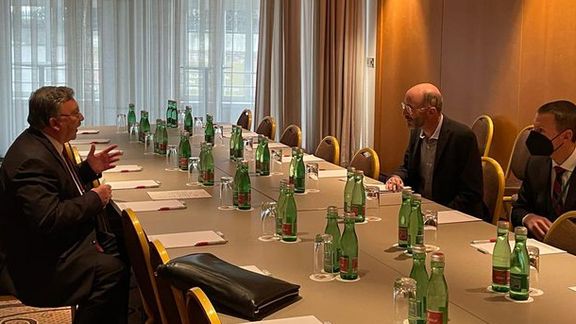
The former Director for Countering Iranian Weapons of Mass Destruction for the White House National Security Council, Richard Goldberg tweeted, “It strikes me as an obvious question to ask any senior official: Can Iran be in full compliance with the JCPOA while remaining in non-compliance with the NPT?”
But Malley’s remark simply followed a statement by National Security Advisor Jake Sullivan on Wednesday that said, “Iran’s issues with the IAEA and efforts to revive the 2015 deal are “on separate tracks, and that’s how we’re going to proceed.”
This in effect means that if Iran continues its non-cooperation with IAEA regarding its past secret nuclear activities, that will not interfere with a new deal.
The question arises if such a US position undercuts the UN nuclear watchdog’s authority not only in relation to Iran but in the bigger picture of global non-proliferation efforts.
Meanwhile, Iranian officials remained defiant as they annouced they are speeding up uranium enrichment, with more advanced machines.
The Wall Street Journal Editorial Board in a column on Thursday said, “There are few good options when dealing with rogue states that have or want the bomb, but rewarding Iran for its malign behavior is easily the worst. It’s all the more remarkable that the Iranians now seem to prefer humiliating the White House over taking the generous concessions apparently on offer.”
US lawmakers, skeptical of the Biden Administration’s Iran policy, will also take a dim view of developments this week, especially Tehran’s decision to turn off IAEA’s monitoring equipment and warnings that Iran now has enough fissile material to race for a bomb almost immediately.
The Democratic chairman of the Senate Foreign Relations Committee, Sen Bob Menendez said Wednesday, “Iran now has enough uranium to produce a nuclear weapon. This latest milestone returns us to a familiar question: At what point will the Administration acknowledge that Iran’s nuclear advances make a return to the 2015 JCPOA not in the United States’ strategic interest?”
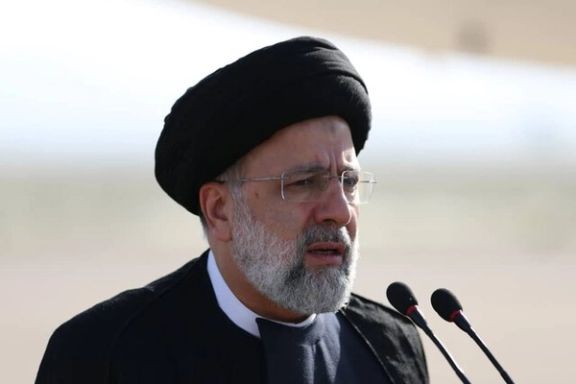
Top Iranian officials Thursday showed defiance in the face of the IAEA resolution criticizing Tehran for lack of cooperation with the UN nuclear watchdog.
One day after the International Atomic Energy Agency passed the resolution, Iran responded by starting to disconnect some 27 cameras and monitoring devices in and around its nuclear sites, as its officials and media continued making defying remarks.
Iran's President Ebrahim Raisi said on the state television that “in the name of God and the great nation of Iran, we will not back off a single step from our positions.” The comment was followed by Foreign Ministry Spokesman Saeed Khatibzadeh's statement in which he said: "Iran's response to the IAEA resolution will be firm and proportionate."
On Twitter, former reformist lawmaker Mahmoud Sadeghi criticized Raisi for making the comment about the resolution and suggested that he should take measures that would prevent the handing over of Iran's nuclear case to the UN Security Council. Other reformists who have been pushed to the side-lines in the past two years were mostly silent.
Also on Thursday, the IRGC-linked Tasnim News agency carried a video showing an Iranian technician turning off an IAEA inspection camera. Meanwhile, another IRGC-linked news agency, Fars, said in a commentary that the resolution passed by the IAEA Board of Governors "Was a purely political measure to exert pressure on Iran." The agency added that the IAEA's action was "wrong and non-constructive."
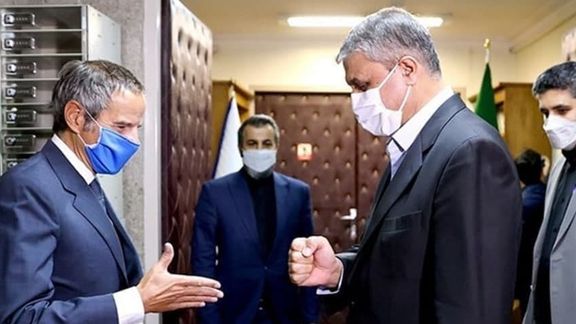
Fars quoted an “expert” as saying that the West has been using the IAEA to portray Iran as rogue. He added IAEA Chief that Rafael Grossi's visit to Israel shortly before the Board of Governor's meeting was aimed at portraying Iran as the non-cooperative party in the nuclear negotiations.
Thursday afternoon, Iran's security Chief Ali Shamkhani said in an interview with Fars News Agency that "The only way to defend Iran's rights against international bullies is to resort to reciprocal action." He added that reciprocity is what should be done in JCPOA talks, with the IAEA and at other forums.
Meanwhile, Fada Hossein Maleki, a member of the Iranian Parliament's national security committee told Fars that further measures are on the way to further restrict Iran's cooperation with the IAEA.
In another development, Didban Iran [Iran Monitor] news website reported on Thursday that media outlets close to Parliament Speaker Mohammad Bagher Ghalibaf as saying that by issuing this resolution, the IAEA and the countries that tabled it have closed the path to the revival of JCPOA. The media outlets close to Ghalibaf also said that the resolution might lead to the end of negotiations and that would be costly for the IAEA.
It is worth noting that the year-long JCPOA talks stopped in March due to Iran’s demands to remove its Revolutionary Guard from the US list of Foreign Terrorist Organization (FTO).
International relations expert Mehdi Motaharnia told Khabar Online website that the IAEA resolution will lead to further frictions between Iran and the West, namely the United States and its three European allies, the United Kingdom, France and Germany.
Meanwhile in a brief commentary on Twitter, international relations expert Diako Hosseini attributed Iran's isolation at the IAEA Board of Governors to the poor performance of its foreign ministry which he said could have interacted with the IAEA in a better way during the past year.
In the meantime, US Secretary of State Antony Blinken wrote in a tweet on Thursday: "The overwhelming majority of the IAEA Board of Governors made clear to Iran that it must provide the IAEA credible cooperation and resolve concerns. At the same time, Iran should use this opportunity to return to full implementation of the JCPOA."